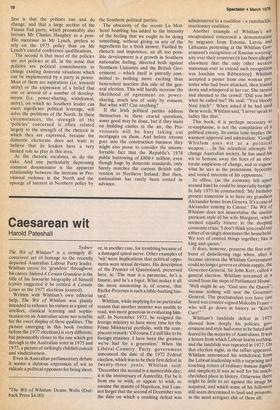Caesarean wit
Harold Pateshall
Sydney The Wit of Whitlam* is a strangely illconceived act of homage to the recently departed Australian Labour Party leader. Whitlam strove for 'grandeur' throughout his career. Indeed A Certain Grandeur is the title of his favourite biography of himself (cynics suggested it be retitled A Certain Loser as the 1977 elections loomed).
Written with Whitlam's own editorial help, The Wit of Whitlam was plainly intended to enhance his stature as a giant of intellect, classical learning and sophistication on an Australian scene not notable for the overt display of these qualities. The picture emerging in this book (written before the 1977 elections) is very different, but presumably closer to the one which got through to the Australian voter in 1975 and 1977, a picture of strikingly childish conceit and vindictiveness.
Even in Australian parliamentary debate it seems a dubious expression of wit to ridicule a political opponent for being short, or, in another case, for trembling because of a damaged spinal nerve. Other examples of `wit' were implications that political opponents were sexual deviates. His description of the Premier of Queensland, preserved here, is: 'The man is a paranoiac, he's a fanatic, and he's a bigot. What makes it all the more nauseating is, of course, that Bjelke-Petersen is such a bible-bashing bastard.'
Whitlam, while implying for no particular reason that another premier was unable to read, was more generous in evaluating himself. In November 1973, he resigned the foreign ministry to have more time for the Prime Ministerial portfolio, with the complacent remark: 'Of course I'd still like to be foreign minister. I have been the greatest we've had for a generation.' When the Liberal-Country Party government announced the date of the 1972 .Federal election, which was to be their first defeat in twenty-three years, Whitlam said: 'December the second is a memorable day; it is the anniversary of Austerlitz. Far be it from me to wish, or appear to wish, to assume the mantle of Napoleon, but I cannot forget that the second of December was the date on which a crushing defeat was
administered to a coalition — a ramshackle, reactionary coalition.' Another example of Whitlam's wit encapsulated concerned a demonstration by migrants from Estonia, Latvia and Lithuania protesting at the Whitlam Government's recognition of Russian sovereignity over their countries (it has been alleged elsewhere that the only other western statesman ever to extend such recognition was Joachim von Ribbentrop). Whitlam accepted a poster from one woman protester who had been attacked, then leaned down and whispered in her ear. She turned and shouted to the crowd: Did you hear what he called me? He said: "You bloody Nazi bitch".' When asked if he had used these words, Whitlam said, 'I never speak to ladies like that.'
This book, it is perhaps necessary to re-emphasise, is not the compilation of a political enemy. Its entire tone implies the warmest approval and admiration: 'Gough Whitlam uses wit as a political weapon . . . In his relentless attempts to change Australian society, he has used his wit to bemuse away the fears of an electorate suspicious of change, and to expose what he sees as the pretensions, hypocrlsY and vested interests of his opponents.'
In office, (as the economy fell apart around him) he could be imperially benign. In July 1975 he commented: 'My birthday present tomorrow is to have my grandson Alexander home from Geneva. It's a case of Alexander coming to Caesar.' The Wit of Whitlam does not immortalise the similar patrician style of his wife Margaret, which seemed equally bizarre in the deeping economic crisis: 'I don't think you could say either of us singly dominates the household. We sort of control things together; like a king and queen.'
It does, however, preserve the first outburst of disbelieving rage when, after it became obvious the Whitlam Government could no longer govern or obtain supply, the Governor-General, Sir John Kerr, called a general election. Whitlam screamed at a crowd from the steps of Parliament House: 'Well might he say "God save the Queen"; because nothing will save the GovernorGeneral. The proclamation you have just heard was counter-signed Malcolm Fraser — who will go down in history as "Kerr's Curr!" ' Whitlam's landslide defeat in 1975 showed how deeply his policies, government and style had come to be hated and feared by the majority of Australians. It was a lesson from which Labour learnt nothing, and the landslide was repeated in 1977. On that election night, as the tallies appeared, Whitlam announced his withdrawal from the Labour leadership with a surprising and touching retUrn of ordinary human dignity and simplicity.It was as well for his much cherished place in history. Otherwise there might be little to set against the image he acquired, and which some of his followers still seem determined to laud and promote, as the most arrogant shit of them all.


































 Previous page
Previous page